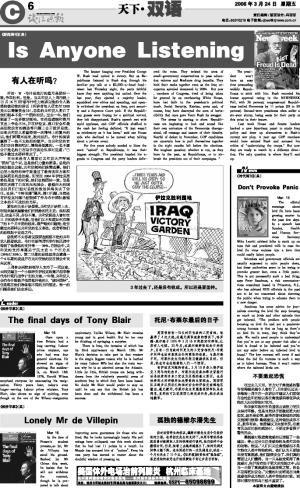The banner hanging over President George W. Bush read united to victory. But as Republicans listened to Bush slog through his familiar pep talk at a $2,500-a-head fund-raiser last Thursday night, the party faithful knew they were anything but united. Over the last year, they ejected a majority leader, squabbled over ethics and spending, and openly criticized the president on Iraq, port security and a Supreme Court pick. If the Republican guests were hoping for a spiritual revival, they left disappointed. Bush's speech met with tepid applause, and GOP officials shuffled to the cash bar feeling deflated. "It just wasn't as celebratory as it has been," said one House aide who declined to be named when talking about a private event.
For five years nobody needed to blare the word "united" at Republicans; it was their biggest strength. The president handed his agenda to Congress and the party leaders delivered the votes. They twisted the arms of small-government conservatives to pass education reforms and Medicare drug benefits. They held their ranks together even as the Iraq occupation spiraled downward in 2004. But now , members of Congress, tired of being taken for granted by an overbearing White House, have lost faith in the president's political touch. Social Security, Katrina, ports and, of course, Iraq have destroyed the aura of invincibility that once gave Team Bush its swagger.
The stress is starting to show. Republicans are beginning to look and sound like their own caricature of the Democrats: disorganized, off message and unsure of their identity. Fearful of defeat in November, GOP candidates are uncertain how to pull themselves together in the eight months left before the elections. The toughest question: whether to run, as they have in the past, as Republicans, or to airbrush the president out of their campaigns. "
The president won't have an easy time persuading wobbly Republicans to stick with him. Bush recorded his lowest approval rating in the NEWSWEEK Poll, with 36 percent; congressional Republicans trailed Democrats by 11 points (39 to 50 percent). Second-term presidents often suffer a six-year slump, losing seats for their party at this point in their tenure.
Last week House and Senate leaders backed a new bipartisan panel to study Iraq policy and draw up alternatives to Bush's current war plan. A year ago GOP members would have saluted Bush and accused his critics of "undermining the troops." But now they are ready to march in a different direction. The only question is where they'll end up.

